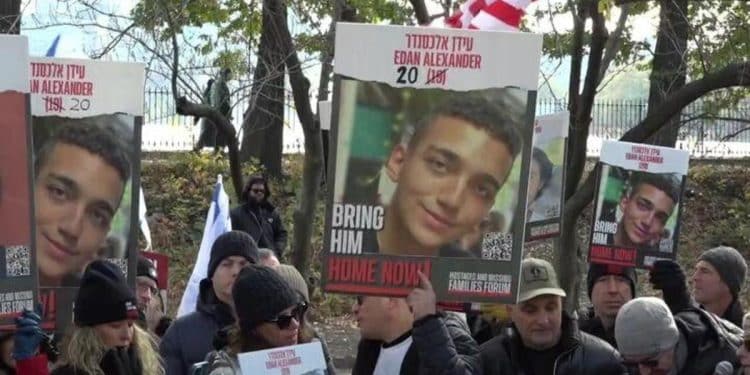Hamas announced on Friday that it had accepted a mediator’s proposal to free one American-Israeli dual national and four bodies of dual citizens who died in captivity. The office of Israeli Prime Minister Benjamin Netanyahu cast doubt on this offer. They accused the U.S.-designated terrorist organization and Israeli of trying to manipulate the talks in Qatar about the next phase of the Israel-Hamas truce.
The government did not specify when Edan Alexander would be released, or what they expected in return.
Alexander was 19 years old when he was kidnapped from his post at the Gaza border in southern Israel, during the Hamas terrorist attack that ignited the war on October 7, 2023.
It was unclear which mediators proposed the Hamas release. Steve Witkoff is the hostage envoy for the Trump administration. He has been pushing the United States to propose a truce extension and a limited exchange of prisoners.
Netanyahu’s office responded to the Hamas announcement by saying that Israel “accepted and demonstrated flexibility” in the Witkoff outline, but “Hamas will not and refuses to budge.”
In a letter to the families of hostage-takers, the government stated that “at the same time it continues to use psychological warfare and manipulation – the reports regarding Hamas’ willingness release American hostages is intended to sabotage negotiations.”
Israel’s negotiation team will return to Doha, the capital of Qatar, on Friday. Netanyahu announced that he will convene the ministerial team he has assembled on Saturday night in order to listen to the negotiators’ views and determine the next step.
The first phase ceasefire was ended two weeks back, but for the moment the fighting is still halted – even if it’s tense.
Last week, the White House made a surprising announcement. It said that American officials were engaged in “ongoing discussions and talks” with Hamas representatives, breaking with a longstanding U.S. practice of not engaging directly with militant groups. Netanyahu’s office responded with a short statement.
The Hamas announcement on Friday about the release the American hostage was not immediately apparent.
In a separate press release, Hamas official Husam BADRAN reaffirmed Hamas commitment to implement the ceasefire agreement fully in all phases. He warned that any Israeli deviation would bring negotiations back to square one.
In the first phase, 25 hostages were returned alive and the remains from eight others were exchanged for the release nearly 2,000 Palestinian prisoners.
Israeli forces retreated to buffer zones within Gaza. Hundreds of thousands of Palestinians who had fled the north of Gaza have returned for the first since the beginning of the war. And hundreds of trucks of humanitarian aid entered each day until Israel stopped supplies.
Israel is pressuring Hamas for the release of half the hostages remaining in exchange for an extension of phase one and a promise of a lasting ceasefire. Hamas has reportedly taken 24 hostages alive and 35 dead.
The group representing the families of the majority of captives has said that while it welcomes plans to release some, the main focus should remain on returning them all.
In a press release, the Hostage Families Forum stated that “without a comprehensive agreement, we risk sealing their fate.”
Israel cut all supplies to Gaza, and its 2 million residents two weeks ago as it tried to get Hamas on board. Hamas said the decision would also affect the remaining hostages.
Hamas says that since Gaza’s support has been cut off, 80% of its population now lacks access to food, and the markets are running out of goods. 90% of Gazans also do not have access to clean drinking water.
Hamas is eager to begin negotiations for the second phase of the ceasefire, which will see the release of the remaining hostages in Gaza, as well as the withdrawal of Israeli troops and a lasting peaceful solution.
As Jews celebrated Purim, Muslims were continuing to observe Ramadan. According to the Islamic Trust which monitors this site, 80,000 Muslim prayer goers prayed at Jerusalem’s Al-Aqsa Mosque compound on Friday. Israel restricts access to the prayers by allowing men and women older than 55 to enter the occupied territories.
Yousef Badelen, a Palestinian from the Hebron city in southern West Bank, said that conditions were extremely difficult. He was trying to reach Jerusalem at dawn. “We hope they’ll open it permanently.”
Hamas has accused Israel of intensifying a “religious conflict” against Palestinians. The Al-Aqsa restrictions are a “systematic targeting muslim religious practices.” The Israeli government didn’t immediately respond.











